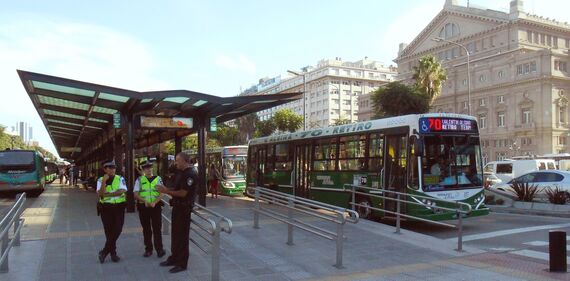
In Dialogue with Mauricio Macri
This interview with Mauricio Macri was conducted on April 20, 2022 by Eduardo Plasencia, masters candidate in Urban & Regional Planning. Mauricio Macri served as president of Argentina from 2015-2019 and as mayor of Buenos Aires from 2007-2015. The interview is part of a research project assessing how projects, policies and politics implemented by the newly created party Propuesta Republicana shifted the civic imagination of Buenos Aires.
Eduardo Plasencia: Thank you, Mr. President, for visiting Georgetown and for your time. I have four questions, grouped into two topics. First, when you took office as Mayor of the City of Buenos Aires, you implemented a series of projects and programs of a more realistic and equitable nature, such as the Metrobús, the Metropolitan Police, Ecobici, the modernization of Government, the Wards, etc.
And I mean realistic and equitable because, by that time, the status quo was that the City needed more expressways, more subways, constantly comparing the City with Madrid or Paris, and even reclaiming projects such as the urban freeways of Cacciatore, the Mayor of the last Military Dictatorship. When did this cultural shift to prioritize more feasible projects, useful for a majority of the inhabitants, happen? Did you already have this mindset when you took office or was it a process that matured in the first years?
Mauricio Macri: There’s a process of learning by doing. First, you had to combine the fiscal restriction. To undertake gargantuan projects, you need resources, and when you do not have resources, you need ingenuity. Then you realize that projects such as the Metrobús have a significantly smaller cost per mile in comparison to building a subway, and it solved the problem for hundreds of thousands of people. We did not resign to say, “oh, well, we don’t have money; there’s nothing we can do.”
It was, in fact, true that the National Government did not support us, didn’t let us engage with World Bank or IDB, so we used our intelligence and creativity to do things. Then we started making plans to the extent of everything that was pending and within the scope of our budget. The restrictions force you to be effective in helping people live better, such as improving their commute, that they feel safer in the streets or safer at home in terms of flooding.
Besides the Metrobús, one of the most relevant projects was the tunneling of the
Maldonado Aqueduct to end once and for all the dramatic floodings in the City. All things that traditional politicians saw as useless because they did not drag votes, particularly those that were done in the underground.
EP: I imagine that there were some of these projects that you felt they couldn’t be done if you didn’t have a second term. For instance, the Metrobús 9 de Julio, doing it in the first term would have been crazy.
MM: No, we couldn’t. Besides, we had to learn how the first Metrobús worked. You have to go from small to big. And so, we said, “let’s build a Metrobús in a medium artery, let’s learn which things work and which don’t, and only then we’ll go for the big projects.”
Clearly, a single period in office is nothing because you need to build the runway from which you’re going to take off. When you build the runway, you lay the foundations on which you will build everything else.
EP: Now, I’d like to connect this with the leap you took to the National Government. When
you started campaigning for the Presidency and touring around the country, how did you feel the rest of the perception of the rest of the Argentineans changed towards the porteños?
MM: There respected what we had achieved in the City, but there was an enormous prejudice and anger accumulated after years of unsolved centralism in Argentina. It is a logical outcome when you have a large and developed metropolis such as Buenos Aires that contrasts with the reality of the rest of the country.
Across the more than 200,000 miles that I traveled as President, I always put a lot of effort precisely into transmitting a federal sentiment of Argentina and in promoting each region’s development with its own riches and connections. I dream of multiple centralities in Argentina.
When you visit the US, and you land in Atlanta, you see that the people of that City don’t read New York’s newspapers, nor do they watch Washington’s television –they have their own reality, their own airport, one of the largest airlines in the world, Coca-Cola, Bellsouth, CNN, and that’s precisely what we need to happen in the Argentinean provinces. This is how it will be in a truly federal Argentina.
EP: Last question. When you were in the National Government, how much did the international connections that you made during your time as Mayor help you to run the country?
MM: A lot, a lot.
In Government, everything has to do with your international connections. A country that needs to develop relies more than any other on having a good relationship with the world to obtain funds, attract investment, or incorporate technology.
All of this I fostered when I was Mayor of Buenos Aires and most of them were forged during my time in Boca Juniors. Soccer can be an amazing bridge to the world!

